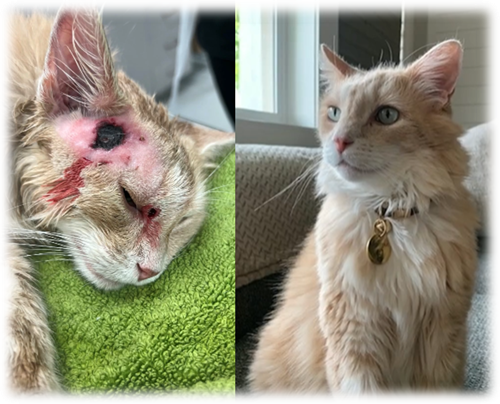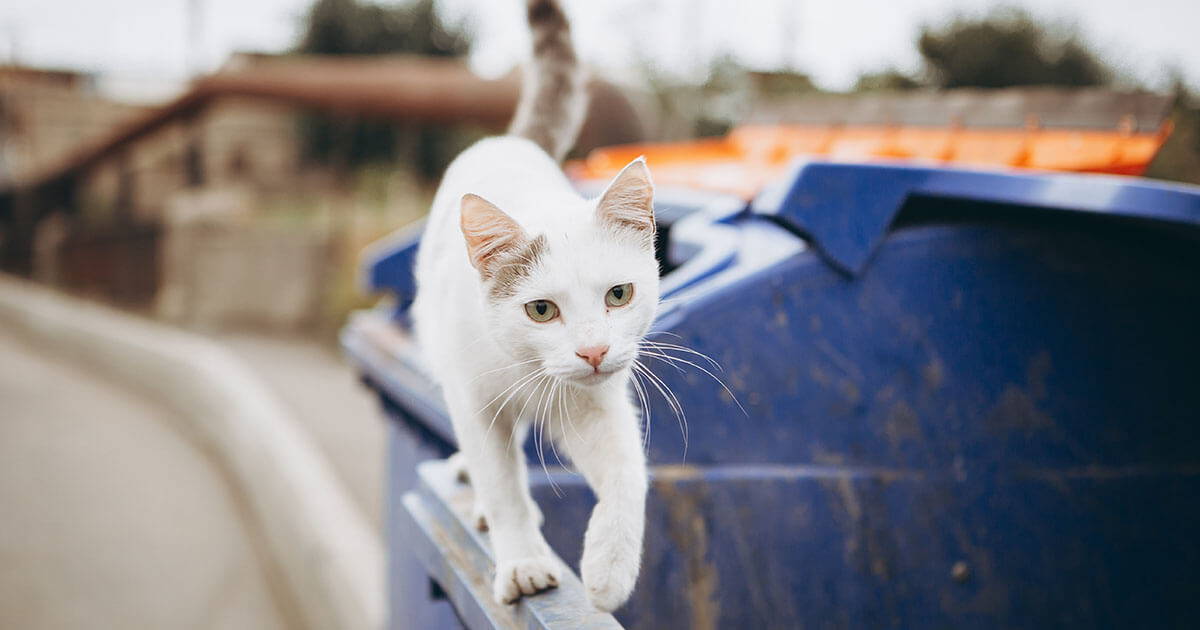A stray cat that stops eating may be ill or stressed. Immediate veterinary attention is recommended.
Stray cats often face challenges that domestic cats do not, such as consistent access to food and medical care. Encountering a stray cat that has lost its appetite can be concerning. Various factors could contribute to this issue, including sickness, injury, or anxiety.
To ensure the well-being of a stray cat exhibiting such behavior, swift action is crucial. As a caregiver or observer, understanding the urgency of the situation and knowing when to seek veterinary help can make a vital difference in the cat’s health. Providing a safe and nutritious food option and fresh water can sometimes encourage eating, but one must be vigilant for signs that point to more serious health issues.

Credit: www.four-paws.org
Recognizing The Signs Of A Stray Cat’s Illness
Stray cats are masters at hiding discomfort.
Unlike pets, they often face tough conditions that make them prone to illness.
Quick action can save a stray’s life.
Let’s learn how to spot the signs of sickness in stray cats.
Spotting Changes In Appetite
Eating habits tell us a lot about a cat’s health.
Is the stray eating less or not at all? This could be a red flag.
Avoiding food might signal pain or disease.
- Check if the cat approaches food then backs away.
- Look for changes in eating speed or preference.
Behavioral Clues And Physical Symptoms
Cats often hide when sick.
A cat that once roamed freely but now stays hidden could be unwell.
Physical symptoms may include:
- Dull fur
- Weight loss
- Watery eyes or a runny nose
| Behavior | Possible Illness Indication |
|---|---|
| Lethargy | Infection or Organ Issues |
| Aggression | Pain or Discomfort |
| Excess sleeping | Various Illnesses |

Credit: www.facebook.com
Immediate Actions To Take When A Stray Cat Won’t Eat
Immediate actions are crucial when a stray cat stops eating.
A cat’s refusal to eat might signal health issues or stress.
Discover what immediate steps to take to ensure its well-being.
Ensuring A Safe And Calming Environment
Create a quiet space away from noise and danger.
This promotes relaxation and may encourage eating.
Provide a comfortable bed and familiarity using a soft blanket.
Use feline pheromone sprays to ease anxiety if needed.
Offering Hydration And Nutrition Support
Dehydration worsens health quickly.
Offer fresh water in a clean bowl.
Try wet food or tuna juice for appetite stimulation.
Ensure the food is at room temperature for palatability.
Choosing The Right Food For A Stray In Distress
When a stray cat stops eating, worry sets in. It’s crucial to assess if it’s just pickiness or illness. Optimal nutrition plays a vital role in recovery. Understanding and providing the right food is essential for a stray cat’s health.
Assessing The Best Dietary Options
Start with a vet check-up to rule out underlying conditions. Once health issues are addressed, consider dietary needs. A balanced diet for a recovering stray consists of proteins, fats, and carbohydrates. A cat with unknown history might need specialized food.
| Type | Benefit |
|---|---|
| Wet Food | Hydration plus nutrition |
| Dry Kibble | Convenient and dental health |
| Fresh Cooked | Tailored to specific needs |
Food Types To Avoid During Recovery
Some foods could hinder a stray’s recovery. Avoid these:
- Dairy products – cause digestive troubles
- Onions and garlic – toxic to cats
- Raw eggs, fish, and meat – risk of bacteria
- Chocolate and caffeine – can be fatal
- Alcohol or sugary foods – extremely harmful
Stick to specific cat food rather than table scraps. Foods high in preservatives and fillers are also a no-go.

Credit: www.facebook.com
Health Checkup: When To Seek Veterinary Assistance
Spotting a stray cat refusing food might raise your concern. Stray cats often face unique health challenges, and a loss of appetite can be a telling sign that something is amiss. Knowing when to seek professional veterinary care can be crucial in safeguarding their well-being. Let’s explore the indications that it’s time to get expert help.
Assessing The Urgency For Professional Care
Immediate action is necessary if a stray cat shows certain signs. Watch for lethargy, visible injuries, or if the cat has not eaten for more than two days. Neglecting these symptoms could lead to serious health issues. Below is a list to help assess the urgency:
- No interest in food or water for 48 hours
- Signs of pain or distress when attempting to eat
- Difficulty breathing, sneezing, or coughing
- Unusual behavior such as aggression or hiding
Common Illnesses That Affect Stray Cats’ Appetite
A variety of illnesses can lead to loss of appetite in stray cats. Some common ones include:
| Disease | Symptoms |
|---|---|
| Upper Respiratory Infections | Sneezing, runny nose, watery eyes |
| Gastrointestinal Issues | Vomiting, diarrhea, constipation |
| Parasitic Infections | Weight loss, visible worms, bloated abdomen |
| Dental Problems | Difficulty chewing, bad breath, drooling |
| Feline Immunodeficiency Virus (FIV) | Recurring illness, poor coat condition, fatigue |
Remember, these ailments require a veterinarian’s diagnosis and treatment. Spotting symptoms early can save a stray cat from further distress and potential health complications.
Ongoing Care Strategies For Recovering Strays
Stray cats sometimes stop eating due to stress, illness, or changes in their environment. Recovering strays require specific ongoing care strategies to ensure a return to health and happiness. Taking a systematic approach to their nutrition and emotional well-being can set them on a path to becoming loving, well-adjusted companions.
Creating A Long-term Feeding Schedule
Establishing a regular feeding routine is key for a stray’s recovery. Consistent meal times help build trust and a sense of security.
- Assess the cat’s needs: Consult a vet to determine the right nutrition.
- Use high-quality food: Opt for nutrient-rich options to aid recovery.
- Start with small, frequent meals: This approach is gentle on a delicate digestive system.
- Gradually increase portions: Adjust the meal size as the cat regains strength.
Set alarms or use apps to remind you of feeding times. It ensures consistency, a crucial element for stability in a stray’s life.
The Role Of Love And Patience In Healing
Healing goes beyond physical care. Love and patience are powerful medicines.
- Spend time together: Regular, peaceful companionship builds trust.
- Speak softly: A gentle voice can be very reassuring.
- Allow the cat to approach you: It gives them control over their environment.
Your kindness can transform a stray cat’s life. Recovery takes time. Celebrate small victories, and remain patient. The reward of a loving pet is worth the wait.
Understanding Stray Cat Behavior And Trust Building
Stray cats often lead hard lives. Having fended for themselves, they might struggle to trust humans. When a stray cat stops eating, it’s not just a health concern—it’s a cry for patience and understanding. Establishing trust is key. And to do that, one must think like a cat.
Gaining A Stray’s Trust Through Consistent Care
Consistency is golden when courting a wary feline’s trust. These shy creatures take note of regular, predictable actions. Here’s how to foster trust:
- Feed at the same time daily to build a routine.
- Speak softly to communicate safety.
- Avoid sudden movements that might scare them.
- Keep a distance to give them space.
Recognizing The Impact Of Trauma And Stress
Stray cats carry unseen scars. Trauma and stress can profoundly affect their behavior. Recognizing these signs is crucial for their wellbeing:
| Behavior | Possible Reason |
|---|---|
| Hiding | Past fears or threats |
| Avoiding food | Illness or stress |
| Aggression | Prior negative interactions |
Patience is vital. A safe space, gentle voice, and gradual approach help in overcoming their past.
Frequently Asked Questions Of Stray Cat Stopped Eating
What To Do If A Stray Cat Is Not Eating?
Check the cat’s health and environment for stress factors. Offer a variety of foods to entice eating. Ensure fresh water is available. Consult a veterinarian if non-eating persists. Keep the area safe and quiet to reduce anxiety.
How Long Can Stray Cats Go Without Food?
Stray cats can survive without food for about two weeks, but this can vary based on their health and environment. Water, however, is crucial and they need it every few days to stay alive.
Will Stray Cats Leave If You Don’t Feed Them?
Stray cats may leave if they are not fed, but this is not guaranteed. Some may stay in the area due to shelter or other food sources.
Why Is My Outdoor Cat Not Eating?
Your outdoor cat may not eat due to stress, illness, changes in food preference, or dental issues. Seek veterinary advice if this behavior persists.
Conclusion
Caring for a stray cat brings its challenges, especially when they lose their appetite. It’s vital to observe them and consult a vet promptly. Regular health check-ups and proper nourishment can keep these vulnerable felines thriving. Remember, your compassion can make a world of difference to a stray’s well-being.
Always be attentive to their needs.

